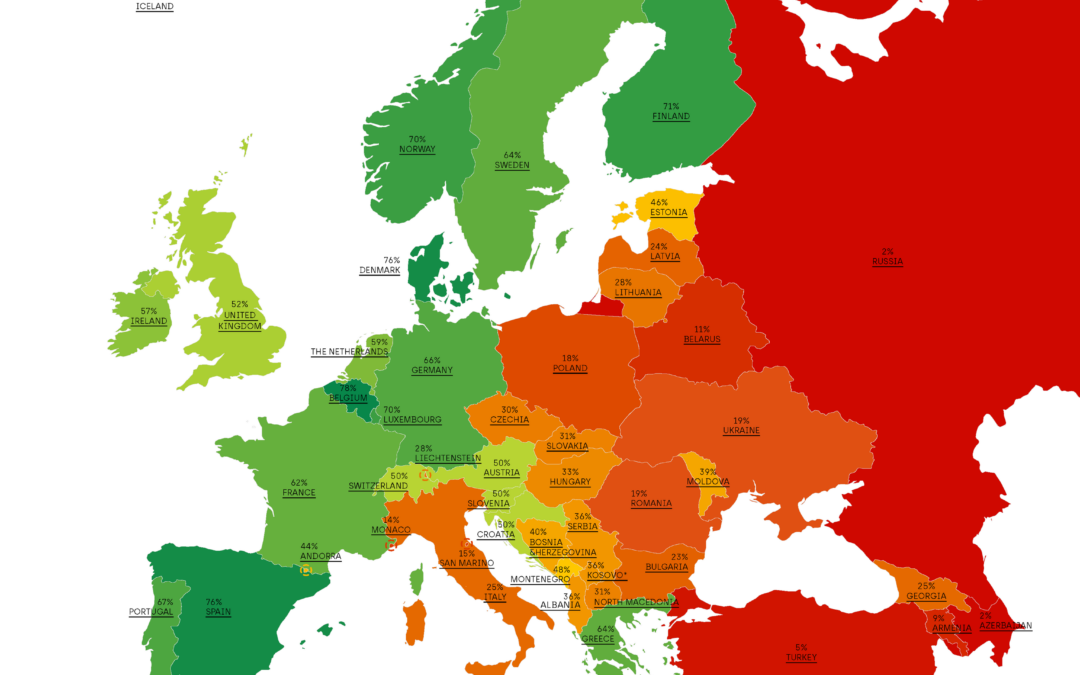The European Commission has announced its intention to end the rule-of-law procedure – known as Article 7 – launched against Poland in 2017 due to concerns over the judicial reforms of the former Law and Justice (PiS) government.
“The commission considers that there is no longer a clear risk of a serious breach of the rule of law in Poland within the meaning of Article 7,” announced the commission on Monday.
It noted that the new government – which replaced PiS in December – “has launched a series of measures to address the concerns on independence of the justice system, has recognised the primacy of EU law and is committed to implementing all [European court] judgments related to rule of law”.
“The commission is therefore informing the [European] Council and the European Parliament of this assessment and of the commission’s intention to…close the Article 7 (1) procedure,” it added.
Today, marks a new chapter for Poland.
After more than 6 years, we believe that the Article 7 procedure can be closed.
I congratulate PM @donaldtusk and his government on this important breakthrough.
This is a result of 🇵🇱 hard work and determined reform efforts.
— Ursula von der Leyen (@vonderleyen) May 6, 2024
The PiS government, which was in office from 2015 to 2023, regularly clashed with Brussels over the rule of law. Its judicial reforms were widely seen by international bodies – and the Polish public – as an effort to bring courts under greater political control.
The new government that took office in December – a broad, pro-EU coalition led by former European Council President Donald Tusk – pledged to reverse PiS’s reforms. In February, it presented Brussels with an action plan to restore the rule of law.
Speaking on Monday, European Commission President Ursula von der Leyen praised Tusk’s government for its “hard work and determined reform efforts”.
“The ongoing restoration of the rule of law in Poland is great for the Polish people and for our union as a whole,” she added. “It is a testament to the resilience of the rule of law and democracy in Europe.”
Justice Minister @Adbodnar has presented plans in Brussels to restore the rule of law by reversing violations by the former PiS government.
EU Commission Vice President @VeraJourova welcomed the move and pledged to help Poland exit the Article 7 procedurehttps://t.co/3qPDuJYUFG
— Notes from Poland 🇵🇱 (@notesfrompoland) February 20, 2024
The European Commission’s position will be presented on 21 May to the General Affairs Council, a body mainly made up of European affairs ministers from all EU member states that coordinates preparations for European Council meetings.
The commission then intends to formally withdraw from the Article 7 procedure after taking into account any observations made by the European Council, which represents the EU’s national governments.
“Steps to promote the rule of law in Poland will continue to be regularly monitored,” added the commission.
‼️@EU_Commission intends to close Art. 7 concerning #Poland.
I welcome the trend of positive changes. While work needs to continue, the risk of a serious breach of #RuleOfLaw is no longer here.
👉 https://t.co/R6OpsT2qsd pic.twitter.com/iVySu1gzd0— Věra Jourová (@VeraJourova) May 6, 2024
The European Commission’s announcement was criticised by figures from PiS, which is now Poland’s main opposition party. They pointed to the fact that Tusk’s government has so far done very little to change laws introduced under the former administration.
“We hear that suddenly the rule of law in Poland is in order, even though in our time [in office] the legal state was exactly the same,” said former PiS Prime Minister Beata Szydło, quoted by news website Niezależna. “Suddenly it turns out that magically things are different.”
PiS has long argued that alleged rule-of-law violations during its time in power were in fact simply a pretext for Brussels to put political and financial pressure on Poland in order to bring about a change in government.
“The one milestone that Brussels expected has been fulfilled: their man in Warsaw [Tusk] is back,” said Janusz Kowalski, who served in the PiS government, in response to the commission’s announcement on Monday.
Zdziwieni nagłym „przywróceniem praworządności” i zamknięciem procedury z art. 7 Traktatu o Unii Europejskiej?
Cóż, jedyny kamień milowy, którego oczekiwała Bruksela, został spełniony – wrócił ich człowiek w Warszawie 🤷♂️ pic.twitter.com/d7lIxNzLJ2
— Janusz Kowalski 🇵🇱 (@JKowalski_posel) May 6, 2024
Most of the Tusk’s governments legislative plans to undo PiS’s judicial reforms have indeed not yet been implemented. In April, its majority in parliament approved a bill intended to restore the independence of the National Council of the Judiciary (KRS), the body responsible for nominating judges.
However, as with much other legislation supported by the ruling coalition, the bill faces a possible veto by President Andrzej Duda, a PiS ally who was closely involved in the former government’s judicial reforms.
Earlier this year, the European Commission also announced that it would unlock tens of billions of euros in funds for Poland that had been frozen due to concerns over the rule of law under the PiS government. Last month, the first tranche of that money, €6.3 billion, was transferred to Warsaw.
Poland has received 27 billion zloty (€6.3 billion) of EU funds as Brussels begins to pay out money frozen under the previous government due to rule-of-law concerns.
The transfer is the largest Poland has ever received in its 20 years of EU membership https://t.co/pNvk6jq74p
— Notes from Poland 🇵🇱 (@notesfrompoland) April 15, 2024
The European Commission triggered Article 7 proceedings against Poland in December 2017 in response to concerns that the policies of the PiS government, in particular its overhaul of the judiciary, represented “a clear risk of a serious breach” of the rule of law, human rights, and press freedom in Poland.
Article 7 can, in theory, result in a member state’s EU membership rights being suspended. However, any such action requires a unanimous decision among all other member states, something that was impossible for Brussels to achieve given that Hungary – also subject to Article 7 proceedings – pledged to support Poland and vice versa.

Notes from Poland is run by a small editorial team and published by an independent, non-profit foundation that is funded through donations from our readers. We cannot do what we do without your support.
Main image credit: European Parliament/Flickr (under CC BY 2.0)

Alicja Ptak is senior editor at Notes from Poland and a multimedia journalist. She previously worked for Reuters.



















